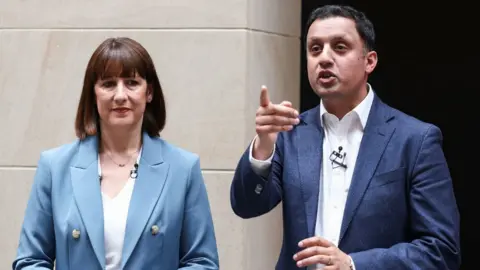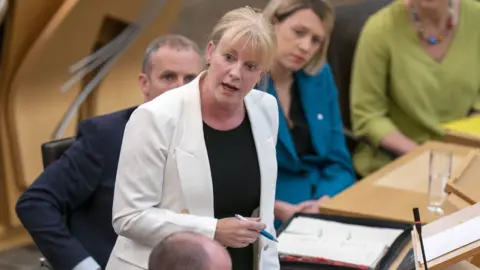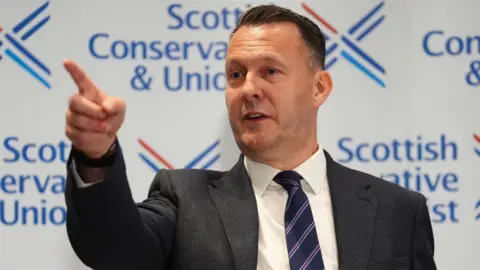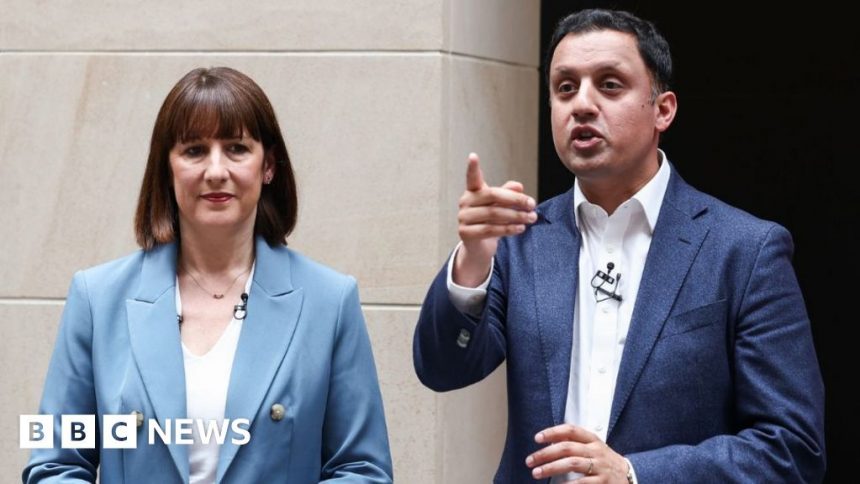Labour budget sets the scene for 2026 Holyrood election
 Getty Images
Getty ImagesThe UK government’s autumn Budget should help Scottish Labour fight the Holyrood elections in 2026.
In the financial year leading up to that vote, the devolved Scottish government will have had an extra £3.4bn to spend – including more money than SNP ministers anticipated for public building projects.
In fact, it’s a lot more money than the Scottish government was anticipating, full stop.
Yes, SNP sources say the increase in day-to-day spending is broadly in line with their expectations.
They mean it is broadly in line with what they have come to expect in recent months because there has been fairly good communication between the UK Treasury and the finance department in the Scottish government.
Think back a little further to the general election campaign and one of the SNP’s key attack lines was that a Labour government would deliver continued austerity.
The Scottish Labour leader, Anas Sarwar, was pushed into a “read my lips” moment to deny that this would be the case.
It turns out the chancellor, Rachel Reeves, has been able to deliver in her first budget.
With £1.5bn in extra spending for the Scottish government this year and an extra £3.4bn in the year leading up to the Holyrood election, the SNP could hardly attack the budget as continuing austerity.
Instead, Scottish Finance Secretary Shona Robison has found herself welcoming it as a “step in the right direction” and trying to claim a degree of credit for Labour borrowing and spending more.
 PA Media
PA MediaShe is also arguing for sustained increases in devolved public spending over the coming years which may form a basis of the SNP’s Holyrood election argument, depending on what the chancellor announces in future financial statements.
The SNP will also continue to argue for more generous welfare spending, including an end to the two-child cap on benefits. That’s a call with which many Labour politicians have sympathy.
The UK government’s response is “ok, what tax would you raise or spending would you cut to pay for it?”
Overall, Labour has blunted SNP criticism of their budget plans and opened up some political space to shift the focus on to the delivery of better outcomes in schools, hospitals and other devolved public services which the SNP has been running for the last 17 years.
Undeniably, there is plenty of room for improvement.
Treasury guddle
Where Labour has spoiled their own post-budget party in Scotland is by getting into a guddle over the detail of the chancellor’s statement.
When Rachel Reeves was asked on BBC Radio’s Good Morning Scotland if her £3.4bn package for Holyrood would be topped up to offset the impact of increased employers’ national insurance contributions on devolved public services, she suggested that had already been taken into account.
In short, the answer appeared to be “no”.
However, her cabinet colleague – Scottish Secretary Ian Murray – and the Scottish government had already said they thought there would be further funding to deal with this.
It seems they and not the chancellor were right, according to a clarification from the UK government.
 PA Media
PA MediaThe questions now are whether the Scottish government will know the details before it sets its 2025-26 budget in December and whether the extra cash will “fully” offset the impact of higher national insurance costs.
The Scottish government has said it needs another £500m but a population-based share of what is spent on this kind of compensation in England is unlikely to deliver that amount because Scotland employs a larger number of health and education workers per head.
These details do matter but the Scottish headline from the first Labour budget in 14 years remains that it has delivered a big increase in public money for SNP ministers to choose how to spend.
The Scottish Conservatives spot a political opportunity in all this for them. To argue, as the party’s new leader Russell Findlay did at First Minister’s Questions, that business and workers need a different approach including tax reductions to flourish.
Their political opponents will say that when Tory prime minister Liz Truss tried that it went badly, damaged the economy and forced her from office.
This budget is already defining the contours of the 2026 Holyrood election campaign.







